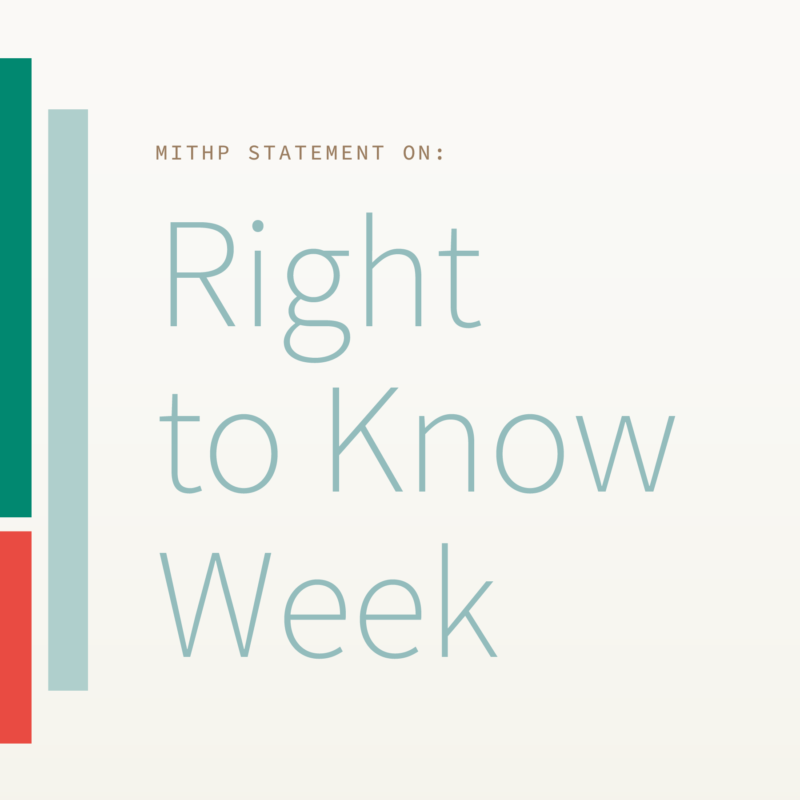Right to Know Week
October 16, 2023

Download this statement in PDF
On September 28th, access to information advocates around the world marked Right to Know Day. In Canada, Right to Know has been extended to the whole week and is an opportunity to make calls for greater transparency and access to government information. Since the introduction of International Right to Know Day in 2002, the movement has developed 10 core principles:
- Access to information is a right of everyone.
- Access is the rule. Secrecy is the exception.
- The right applies to all public bodies.
- Making requests should be simple, speedy, and free.
- Officials have a duty to assist requesters.
- Refusals must be justified.
- The public interest takes precedence over secrecy.
- Everyone has the right to appeal an adverse decision.
- Public bodies should proactively publish core information.
- The right to know should be guaranteed by an independent body.
Source: https://www.oic-ci.gc.ca/en/right-know
The Right to Know movement is especially relevant to MITHP, as well as to the work of many Indigenous communities across the country investigating missing children and unmarked burials and cemeteries. Accessing government records, particularly ones concerned with health, remains an overwhelming obstacle to overcome in searching for loved ones who were sent to Indian hospitals and sanatoriums who never returned home. Even when records that could answer important questions for these individuals, families, and communities are accessible, there are often still lengthy wait times to receive the material. Governing bodies in Canada must address the blockades created by Access and Privacy These laws prevent Indigenous people from accessing their own data and that of their family members, and stakes that go with this lack of transparency are severe.
Drawing from Right to Know’s 10 core principals, MITHP makes the following calls to action:
- We call upon the Province of Manitoba, Manitoba Health, the Archives of Manitoba, Manitoba’s Vital Statistics Agency, and any other related departments or agencies to ensure that requests for information relating to the locations of the deaths and burials of Indigenous people who may have been sent to and may have died at a hospital or sanatorium be made available to family and community members through processes that are simple, speedy, and free.
- We call upon the Province of Manitoba, Manitoba Health, the Archives of Manitoba, Manitoba’s Vital Statistics Agency, and any other related departments or agencies to provide respectful, trauma informed, and culturally appropriate assistance to any family or community member requesting information relating to the locations of the deaths and burials of Indigenous people who may have been sent to and may have died at a hospital or sanatorium be made available to family and community members.
- We call upon the Province of Manitoba, Manitoba Health, the Archives of Manitoba, Manitoba’s Vital Statistics Agency, and any other related departments or agencies to provide respectful, trauma informed, and appropriate explanations justifying any refusal to provide family or community members requesting information relating to the locations of the deaths and burials of Indigenous people who may have been sent to and may have died at a hospital or sanatorium.
- We call upon the Province of Manitoba, Manitoba Health, the Archives of Manitoba, Manitoba’s Vital Statistics Agency, and any other related departments or agencies to provide appropriate guidelines and oversight to ensure that in all access to information policy and procedures, public interest takes precedence over secrecy.
- We call upon the Province of Manitoba, Manitoba Health, the Archives of Manitoba, Manitoba’s Vital Statistics Agency, and any other related departments or agencies to ensure that everyone has the right to appeal an adverse decision, and that the process for such appeals is transparent, accessible, trauma informed, and culturally appropriate.
We call upon the Province of Manitoba, Manitoba Health, the Archives of Manitoba, Manitoba’s Vital Statistics Agency, and any other related departments or agencies to ensure that, in the context of all of their operations, the right to know is guaranteed by an independent body.
